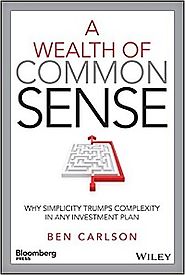-
About
- About Listly
- Community & Support
- Howto
- Chrome Extension
- Bookmarklet
- WordPress Plugin
- Listly Premium
- Privacy
- Terms
- DMCA Copyright
- © 2010-2025 Boomy Labs


 Kathy Waite
Kathy Waite
Listly by Kathy Waite
A round up of personal finance news, blogs and book reviews from around the internet
Feel free to add or vote up and down your favourites , comments always appreciated, agree or disagree and share with your friends and family

Heidi chats with The Money Finder's Stephanie Holmes-Winton about keeping your financial perspective in order for the new year.
A common misconception is that Canadians regularly travelling to the U.S. for long stays can spend up to 182 days, or six months, in the U.S without being considered a resident for tax purposes. It's actually 120 days, or four months, averaged using a special formula over a period of three years.
Canadians who overstay their welcome in the U.S. are at risk of:

Investors thinking of selling amid the current market turmoil should resist that urge, Vanguard Group founder Jack Bogle says.

In his recent book, A Wealth of Common Sense, asset manager Ben Carlson (who writes an excellent blog with the same title) reveals that he’s made the same discovery: investors resist simplicity. Yet Carlson believes it’s the right solution for most of us. “I’ve spent my entire career working in portfolio management,” he writes. “This experience has taught me that less is always more when making investment decisions. Simplicity trumps complexity. Conventional gives you much better odds than exotic.”
A Wealth of Common Sense is one of the wisest investing books I’ve read in the last several years. Some of its arguments are not particularly novel: for example, he spends a lot of time discussing the familiar obstacles active investors face in their attempts to beat the market. But Carlson also has some refreshing insights to share:
A lot of complexity is just BS. “Complexity tends to be the default option that gets used to persuade investors to buy unnecessary investment products,” Carlson writes, “while the vast majority of people really just need to understand more conventional options to succeed.” When fund companies, media gurus and advisors peddle clever-sounding strategies, they’re creating “an illusion of intelligence and control.”

Richard Thaler’s concept of Loss Aversion behaviour states that people will feel more hurt emotionally with a loss than an equivalent gain gives pleasure.
Consequently, we will be more prone to take excessive risks to eliminate that loss.
Thaler also observed this phenomenon in reverse: specifically, in how people behave when they are making successful financial/investment decisions.

A recently published study out of the U.K. that found that spending substantially declines (in real terms) after a certain point in retirement, with the tipping point being in the 70–74 age range? A decline that occurs at all income levels.
Except in the early stages of retirement, the study (Understanding Retirement Journeys: Expectations vs. Reality) also found that retirement does not lead to people buying more vacations or other leisure activities. And it found retirees at all income levels building up savings, even the group described in the paper as “just getting by” when they retired. For individuals age 80 and over, the average amount saved was £5,870 a year (C$12,100)!

So does he believe that this latest film adaptation of one of his books — which also stars Brad Pitt among its stellar cast — will generate such clamour for financial reform that it finally provokes the changes he so desperately wants?
‘I don’t think so,’ Lewis says. ‘The reality is that a major restructuring of the financial services industry will only ever happen if we get another really big crisis.’

No one would be excited to watch a business-news show or to buy a financial magazine that continually reminded them to simply invest in low-fee index funds. No advertiser is excited about it, either—who would want to advertise stock-market newsletters, commodity futures, or actively-managed mutual funds on programs that constantly remind viewers that these goods and services should be shunned?
Dispensing dicey stock-market advice provides a much better financial model for business media, if not for viewers. At best, listening to personalities’ investment tips is a waste of time. But it’s often worse than that. Much of this advice is harmful (though probably less harmful than the financial products being hawked during the commercial breaks).

PS , skips the ad!
Of course everybody thinks saving for the future is a great idea, but the problem is that it can be hard to find the money to put away in the first place.
News Year resolution
Write down each regular payment you make and decide if you really want them, can you reduce the level of service.
Remember we can do ANYTHING we want with our money just not EVERYTHING

Last time on How to Win the Loser’s Game… So, how can ordinary investors apply the academic evidence - the lessons learned from more than a hundred years of research
My favourite TV channel sensible investing
watch this in sections with a coffee and a cookie or in one go https://youtu.be/SwkjqGd8NC4

During the 1920s, cinematographer Claude Friese-Greene travelled across the UK with his new colour film camera. His trip ended in London, with some of his most stunning…

Registered Retirement Consultant. Your Net Worth Manager Fee Only Financial Planning for regular people in Saskatchewan and across Canada
Retirement designer and money ninja !